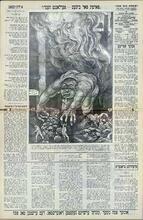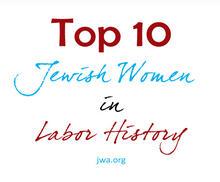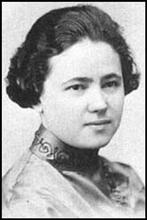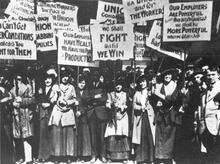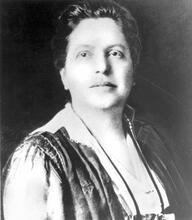Fannia M. Cohn
Fannia M. Cohn was one of the leading Jewish women trade union activists in the United States. In 1909, she was a founding member of a local chapter of the International Ladies Garment Workers Union (ILGWU), and in 1913 she served as a delegate to the ILGWU national convention. From 1916 to 1926 she served as ILGWU’s first female vice president, initiating programs for workers’ education. She also served on the board of the Workers’ Education Bureau. Cohn regularly fought with union leaders who wanted schools merely to indoctrinate union officers; she wanted the schools to remain independent and to offer classes on a broad range of topics. ILGWU leadership finally forced her to retire in 1962, months before her death.
In the first half of the twentieth century, Fannia M. Cohn was one of the leading Jewish women trade union activists in the United States. Drawing on her Russian Jewish cultural traditions, she pioneered in the development of educational programs within the International Ladies Garment Workers Union (ILGWU). Ultimately, however, male opposition undermined her efforts and diminished her long-term significance. Her life offers evidence of the possibilities and limitations of women’s activism in the American labor movement.
Activist Beginnings
Fannia Cohn, the fourth of five children of Hyman (Chaim) and Anna (Rosofsky) Cohn, was born in Kletzk, in what is today Belarus. She came from a prestigious and wealthy Russian Jewish family, and her father managed a family flour mill. She was encouraged to read, was educated privately, and at age fifteen became involved in clandestine revolutionary activities.
In 1904, following a pogrom in which her brother was almost killed, she and her brother emigrated, using second-class steamship tickets purchased by wealthy cousins who were already living in New York. She worked at first as the representative of the American Jewish Women’s Committee at Ellis Island. Eschewing further education and employment in her relatives’ business, she took a job in 1906 as a sleevemaker, with the clear intent of becoming involved in trade union work. In 1909, she was a founding organizer of ILGWU Local 41, a local for wrapper and kimono makers. In 1913, Cohn led a white goods strike and served as a delegate from the local to the ILGWU national convention.
In 1914 she moved to Chicago, where she attended a school for labor organizers sponsored by the Women’s Trade Union League. Dissatisfied with the courses offered at the University of Chicago, Cohn made her own arrangements to take private English lessons. She was soon working for ILGWU again, organizing dressmakers. In 1915, she helped lead a strike at a contract shop for Sears, Roebuck. In early 1916, she left Chicago and returned to New York City.
Worker’s Education
That same year, Cohn was elected vice president of the ILGWU, the first woman to serve in such a high office in that union. Reelected four times, she served ten years on the union’s executive board. The position made Cohn a union policymaker, and in 1917, she launched ILGWU programs in workers’ education, thus moving into the career niche that became her life’s work. The ILGWU sponsored a Workers’ University at Washington Irving High School in New York City, and Cohn succeeded in establishing educational programs in other cities, including Boston, Chicago, Cleveland, and Philadelphia.
Fannia Cohn took part in a wide variety of workers’ education activities. She was instrumental in the founding of Brookwood Labor College, the first residential workers’ college in the United States. She was a founder and board member of the Manumit School, a school for workers’ children in Pawling, New York. She also served on the board of the Workers’ Education Bureau, an umbrella organization promoting activities in the area of workers’ education. In the 1920s, she attended major international conferences on workers’ education in Brussels and Oxford. She developed an international network of contacts and became widely known for her pioneering work in the field.
Opposition
Despite her international notice, Cohn did not enjoy unqualified support within ILGWU circles. As a woman in a male-dominated union hierarchy and an idealist among bureaucratic functionaries, her efforts to promote workers’ education met stiff opposition. She made enemies in the anticommunist 1920s by tolerating socialists and communists within the workers’ education movement. She saw workers’ education as a valuable aspect of trade unionism in its own right, while ILGWU officers saw it as a tool to build their own power. Male union leaders struck repeatedly at the independence of the educational institutions that emerged from Cohn’s efforts. In 1928, the American Federation of Labor withdrew its financial support for Brookwood Labor College, accusing the college of permitting communists in its faculty and fostering anti-AFL sentiment among its students. In 1929, the AFL took over the Workers’ Education Bureau, thus turning that organization into a subordinate arm of organized labor.
Although a founder of educational activities within the ILGWU, Cohn never headed the union’s education department. Her job titles varied, but for over forty years, the official head of her department was always someone else. She worked closely with Juliet Poyntz, Louis Friedland, and Alexander Fichandler, the first directors of the department, and often ran the department in fact, if not in name. But in 1935, when the ILGWU stripped her of her title as executive secretary and brought in an Englishman, Mark Starr, to head the department, Cohn’s fury rose. She wrote to ILGWU president David Dubinsky, describing her demotion as “unwarranted” and “inhuman,” an affront to the twenty-five years she had spent working for the union and her eighteen years guiding its educational efforts.
Increasingly, the union implemented a narrow program of labor education, rather than Cohn’s broader vision of workers’ education. ILGWU leaders desired obedient members and well-trained officers. Cohn’s efforts had been geared to empowering rank-and-file members, awakening them to new intellectual and cultural currents, and stimulating them to become more active in union affairs. The union’s male leadership did not share her vision; rather, they were threatened by it. Although Cohn continued to work within the education department until her retirement in September 1962, she was increasingly isolated in her work.
Legacy
Cohn’s life was her educational work. When the union cut funding for her projects, Cohn quietly raised money from family members to keep the activities going. She did not retire on her own; the union finally scheduled a testimonial dinner in her honor to force the issue. She was seventy-six years old at the time and lived only another three months. Although she was embattled during much of her career in the ILGWU, her work was appreciated beyond the ranks of union officialdom. Charles Beard praised her “splendid efforts in the field of labor education.” Rose Pesotta, a noted ILGWU organizer and herself a vice president of the union, understood the contradictions of Cohn’s life and work: “Fannia Cohn’s service to our organization is only recognized by those on the outside who can dispassionately evaluate such unselfish efforts on the part of one person for the cause of worker’s education. ... She remains a tragic figure amidst her own fellow workers. ... Were she a man it would have been entirely different.”
Fannia M. Cohen died in New York City on December 24, 1962.
Antonovsky, Anton. Papers. Box 115, YIVO Institute for Jewish Research, NYC.
Biographical Dictionary of American Labor Leaders (1974).
Cohen, Ricki Carole Meyers. “Fannia Cohn and the International Ladies’ Garment Workers’ Union.” Ph.D. iss., University of Southern California, 1976.
Cohn, Fannia. Papers. Rare Books and Manuscript Division, New York Public Library.
ILGWU and Workers’ Education Bureau. Papers. New York State School for Industrial and Labor Relations, Cornell University, Ithaca, N.Y..
NAW modern.
Orleck, Annelise. Common Sense and a Little Fire: Women and Working-Class Politics in the United States, 1900–1965 (1995).
Who’s Who in Labor (1946).
Wong, Susan Stone. “From Soul to Strawberries: The International Ladies’ Garment Workers’ Union and Workers’ Education, 1914–1950.” In Sisterhood and Solidarity: Workers’ Education for Women, 1914–1984, edited by Joyce L. Kornbluh and Mary Frederickson (1984).


